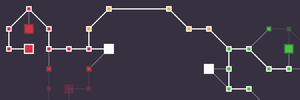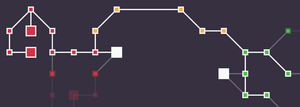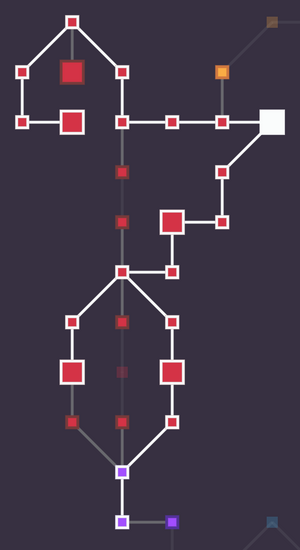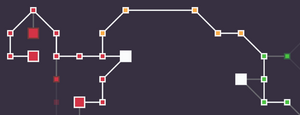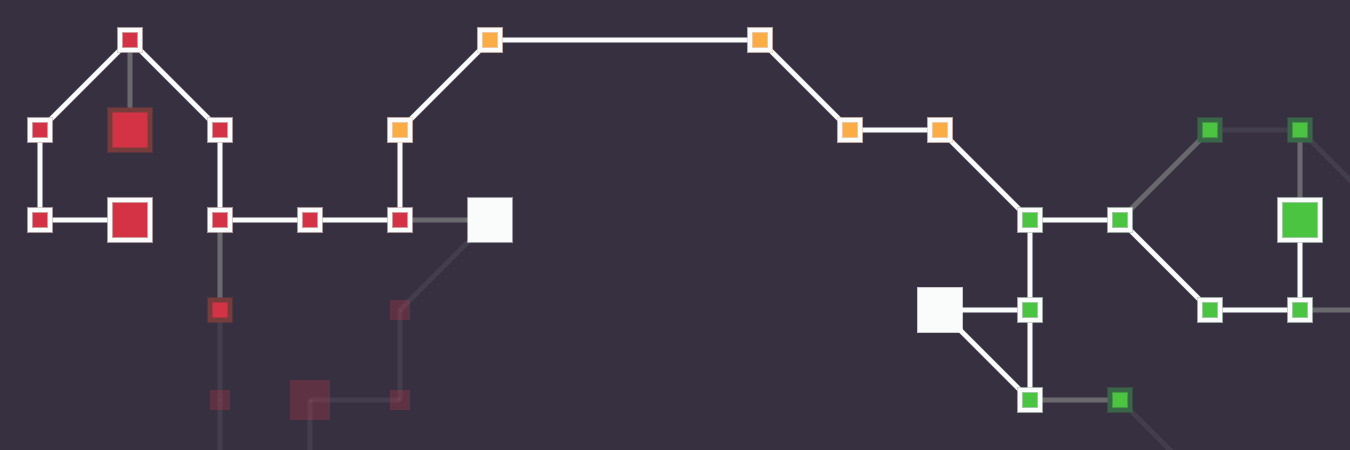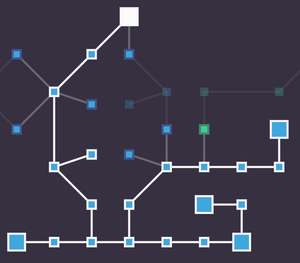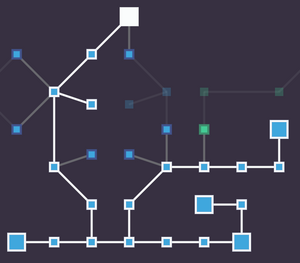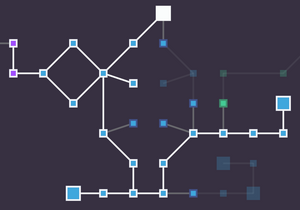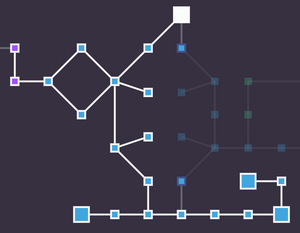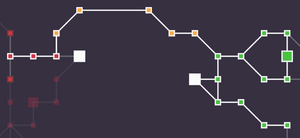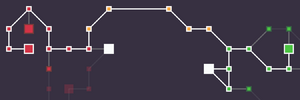Advanced Guide
Advanced Guide[edit]
No Version: This article explicitly has no version. It is likely not maintained or needed enough to be always kept up to date, and everything should be considered outdated and double-checked when used if necessary.
Player Opinion: This article contains advice from other players which may be subjective or incorrect. Consult this guide with caution.
WIP: This article is a work in progress, meaning that it is being worked on but is unfinished. You can help by editing it.
This is a general guide that covers advanced tips, endgame goals and builds.
Advanced Levelling Guide[edit]
How to Level Up?[edit]
You gain experience in several ways; killing mobs, gathering herbs and fish, and completing quests.
There are a few game mechanics that are useful to know:
- killing mobs gives you the most experience when the mob is at the same level as your character
- quests give xp relative to the average mob level of the zone they are in
- when you die, you lose 5% of the total experience required to get to the next level
- when you die, you do not lose any levels
- as long as give damage to a mob, or heal damage from a mob (to yourself or other players) you will get full xp and loot when that mob dies, no matter who 'kills' it. This is helpful for multiplayer gameplay, as there is no 'stealing kills' possible.
- the quality and quantity of loot from a mob is determined by the player that deals the killing blow. A player with max quantity & quality stats (qq) often will ask to get 'last hit' so their maxx qq stats can apply to the kill. In this instance, every player who is eligible for loot (if you gave or healed dmg) will get loot at the max qq stats. This means everyone would get more loot and better loot (which is very helpful for completing quests).
Until you are level 6 or 7, killing mobs is by far the fastest way to level up. Try to find mobs at your level or within one or two levels or your own. Quests in Fjolarok (the lower island) are largely irrelevant; the xp is low and they can be slow to complete. If you can find a higher level player to help, power-levelling is possible, where the low level player attacks a mob first, which the higher level player can quickly kill off.
Once you reach level 6 the Fjolgard quests open up. Fjolgard is the upper island, accessible from a bridge/portal and the top of Fjolarok. If it is your first play through, I recommend waiting until at least level 7 before attempting Fjolgard quests.
A good time to try advancing zones is after immediately after levelling up, since you will lose minimal xp upon death (you will only lose the xp you gained since levelling up last).
Below is a basic guide. You can adjust by a few levels around each threshold depending on your preferences.
- Level 1-3: Tutorial
- Level 3-7: Fjolarok mobs
- Level 7-10: Fjolgard quests
- Level 11-13: Sewer dungeon quests
- Level 14-20: Crystal Caverns dungeon quests
- Level 20-23: Blisterwind Isle quests
An alternate area to farm xp for Level 18-20 is the Estuary. There are no quests here, but the reputation bonus from killing Estuary mobs will eventually allow you to purchase an important healing item (the Cowl of Obscurity).
- Tip: Killing high level mobs does not gain you extra xp. Completing high-level quests does give you extra xp. If you are power-levelling with a friend, try quests in advanced zones (so long as you can survive!)
When levelling additional characters to 23, the experience can be made much easier through proper itemization and decision making.
Itemization[edit]
In order to maximize the rate of xp gain, it is important to be able to complete quests as quickly and often as possible. The most common quest types are ones asking to loot specific categories of items (purveyor quests), so to facilitate this it is important to have as much 'item quantity' as possible. This can be done either by setting up quantity items on a levelling build or by having another player using a 'quant' build take the last hit on every enemy.
Occasionally, there will be quests asking for magic quality equipment of a specific categories or asking for any rare quality equipment. In order to facilitate this, some 'item quality' helps immensely. You can do this again by putting it onto the levelling build itself, having an external player with it, or by killing or assisting in the killing of bosses such as Stinktooth or Radulos, which are guaranteed to drop several higher rarity items.
Decision Making[edit]
Before you start picking up your loot drops, you should ask yourself if it helps you complete your current quest. For example, if you are in sewers and have a quest to kill 9 rats, it is best for you to avoid picking up any loot they drop in the hopes that a purveyor quest is coming soon. Saving the drops can allow you to build up many lootable items on the floor allowing for rapid completion of purveyor quests when they appear. Additionally, hold off on picking up magic quality (green) or higher items, as those can be used for the purveyor quests associated with higher quality items. HOWEVER, eventually items do despawn after 10 minutes, so be mindful of how long you have left your loot on the floor.
End Game Goals[edit]
Here's a list of things to work on (mainly lategame):
- Reaching level 23 (on all 3 spirits)
- Farming Stinktooth/M'ogresh/Radulos/Nyxaliss and Trials of the Abyss for gear.
- Find/augment full legendary gear (has more rolls)
- High damage roll weapon
- High rolled runes
- Unlock Whirlwind (from Stinktooth)/Ambush (from Bera) recipes
- Farming for Putrid Shank (from Stinktooth)
- Farming for Steelclaw's Bite (from Stinktooth)
- Farming for various Nyxaliss drops
- Farming for Corrupted Blossom (from Temple)
- Farming for Cowl of Obscurity (from Gaekatla rep)
- Farming for Gaekatlan Druid skin (from Gaekatla rep)
- Farming for Bonecaller's Crown and Morbid Marrow
- Seasonal events
- Contribute to the crippling wealth gap by getting an unholy amount of idols
- Become the strongest :D
Spirit Tips[edit]
Owl[edit]
Summon Skeleton are many times used by slightly weaker owls to help keep enemies away by distracting them. Although it is recommended to use no more than 2, so that you have alternative attacks in case you are caught off guard while summoning a skeleton.
Ice Spear can be used to deliver a quick hit thanks to its low cast time. However, it does have a long cooldown.
Magic Missile simply deals massive damage in exchange for a medium cast time and slightly long cooldown.
Smite can be paired with Magic Missile for some extra damage, as the smite stun is usually long enough to get an MM in.
Fireblast can be used to keep mobs at distance for a few more ticks, allowing critical time to cast a final MM or cons to heal. It also works well when paired with Ice Spear or Smite. Owls can farm groups of enemies by coupling Fireblast with a source of healing such as Consecrate, Cowl of Obscurity, or Healing Touch.
When engaging in combat alone (or in a duo if using Vile Essence), a Healing Touch may be used instead of a Consecrate as it provides better hpt on single targets, although it relies the caster to be reactive towards damage taken rather than proactive, which can be more dangerous.
Owls generally use Tomes as the preferred offhand slot item because of the spell crit chance and multi implicits being more useful than the block chance implicit stat of the Shields. Some owls prefer to use shields for more armor, because owls are generally have less health and armor than other spirits. The Strength requirement on shields can sometimes be a problem though.
Bear[edit]
Bear can farm groups of enemies via AoE damage sources such as Rune of Whirlwind, Shield of Lustre, or Gourdhowl together with a source of healing such as LoH, Cowl of Obscurity or Harvest Life.
Rune of Flurry may be used in pairing with a high damage axe to deal large amounts of damage in a short period of time.
If not using an axe, bears generally use Shields as the preferred offhand slot item because of its block chance implicit stat being more useful than the Spell Crit Chance and multi implicits of the Tomes.
Using a Charge to stun and a Slash to inflict large amounts of damage works very well on bosses such as M'ogresh.
Lynx[edit]
Rune of Flurry may be used in pairing with a high damage spear to deal large amounts of damage in a short period of time.
Lynxes generally use Gilded Shield as the preferred offhand slot item because the armor implicit stat being more useful than the Spell Crit Chance and Multi implicits of the Tomes.
Due to how often lynx can apply damage with Smokebomb, building for crit with a Cowl of Obscurity vastly increases a lynx's durability.
List of Builds[edit]
Most builds are designed around a certain spirit and a level 20 character. Before level 20, different stats might be more important to kill mobs and level up as fast as possible so players can start working on getting the strongest endgame gear. It's probably best to focus on reaching level 20 before specializing your build.
Bear[edit]
| Slash | ||
|---|---|---|
Spirit |
Bear | |
Description |
Use flurry to deal high single target damage | |
Type |
Damage | |
| Specific Gears | Runes to use | Stat to focus on |
|
| |
Passive tree choices
Choose depending on which improves dpt more, the first tree is typically stronger due to the % of a single stat roll the nodes represent (the difference is a 3.5 chance node vs a 40 multi node, the chance node represents about 0.9 max rolls while the multi node represents about 1.3 max rolls)
How to use :
The main idea is getting as much crit chance/mult, str, and physical increase to pump weapon, slash, harvest, and charge damage
- Regular axes are an option if Gourdhowl is not readily obtainable, or you can run a one-handed weapon such as a Sword or Sunsickle with Shield of Lustre
- The cowl of obscurity and harvest lifes are important survivability tools
- Whirlwind can be used as a way to clear out groups of enemies
written by Arkie for v0.11.0, edited slightly by cow
| High damage flurry bear | ||
|---|---|---|
Spirit |
Bear | |
Description |
Use flurry to deal high single target damage | |
Type |
Damage | |
| Specific Gears | Runes to use | Stat to focus on |
|
| |
Passive tree choices
Choose depending on which improves dpt more, the first tree is typically stronger due to the % of a single stat roll the nodes represent (the difference is a 3.5 chance node vs a 40 multi node, the chance node represents about 0.9 max rolls while the multi node represents about 1.3 max rolls)
How to use :
The main idea is getting as much crit chance/mult, str, and physical increase to pump weapon damage for flurry
- Regular axes are an option if Gourdhowl is not readily obtainable
- The cowl of obscurity is an important survivability tool
- Vitality and resistances can help you survive a flurry cast with bad rng
- Having some mana regen and using Tranquility can help alleviate the high mana cost of flurry
Flurry is NOT a consistent source of damage, so this build is abnormally reliant on rng
written by Polfy, edited by Arkie for v0.11.0, edited slightly by cow to include Soul's rings
| Steelclaw's Bite Bear | ||
|---|---|---|
Spirit |
Bear | |
Description |
Use the Steelclaw always crit + Harvest life to deal damage/regen hp | |
Type |
Damage / Tank | |
| Specific Gears | Runes to use | Stats to focus on |
|
| |
Passive tree choices
Choose depending on preference or on which stats you are missing (first tree is survivability focused while second tree is damage focused)
How to use :
The main idea is to both deal damage and regen hp using scb Steelclaw's Bite, while being tanky enough to survive your own self damage and the enemies' damage.
- Ideally 2 harvest life runes will be used, this is the perfect amount to harvest, take 2 steps, and harvest again (this is important for doing m'ogresh)
- All attribute is a blessing, as harvest life scales off of 0.75x the sum of int+str, meaning all attribute is basically 1.5 mainstat for the purposes of scaling damage instead of 1.
- Focus on improving vit/res stats first, as they are vital to not killing yourself with scb.
- Depending on if you are above/below 134% attack speed, 52/48 mana regen is the breakpoint to infinitely sustain 2 harvest lifes on cooldown, realistically you will need less as you should not be casting off cooldown too often
- Spare rune slots is ideally dedicated to either Tranquility or Innervation
- Its far more important to have less damage and more survivablity, its ruined if you risk becoming so low that you kill yourself on attack.
- Cowl of obscurity is not required if you can heal consistently from your harvests.
- It's important to play with stats to find a perfect mix between tankyness and damage.
- Once perfected it becomes nearly impossible to die, allowing bears to solo temple and M'ogresh as well as event bosses. The downside is it's slower due to dealing less damage than a traditional build might.
written by Polfy, edited by Arkie and Icono for v0.11.0, slightly edited by cow to include Soul's rings
| Tank bear | ||
|---|---|---|
Spirit |
Bear | |
Description |
Max armor/resist high vit/hp regen tank | |
Type |
Tank | |
| Specific Gears | Runes to use | Stats to focus on |
|
|
|
Passive tree
Pathing to multi on the tree is not particularly useful in this case, it is up to personal preference where those points should be allocated, although the attack speed can help reduce harvest life cast time from 3 ticks to 2 ticks if an additional 18% attack speed is present from gear stats
How to use :
This build is purely theoretically useful and will not be practical until the addition of a rune that can establish threat not based on damage dealt (bear attacks and runes have threat multi present on them, but that is based on damage dealt so tank bear cannot realistically take aggro). UPDATE: such a rune now exists, Rune of Taunt.
written by Polfy, edited by Arkie for v0.11.0, edited by cow to include Soul's rings and taunt
| Sickle Bear | ||
|---|---|---|
Spirit |
Bear | |
Description |
Necro-ish build focused on harv and sickle | |
Type |
Tank | |
| Specific Gears | Runes to use | Stats to focus on |
|
| |
Passive tree choices
Passive tree is completely up to personal preference here, just go with whatever feels best
How to use :
The main idea of this build is similar to scb bear, but instead of relying on scb to artificially inflate damage at the cost of extra levels of danger, a sickle and loh are used to increase survivability at the cost of damage (it is possible to actually outdamage scb bear because you are not limited by your own hp pool regarding how hard you can hit)
- Any regular sickle can be used if sunsickle is not readily obtainable
- High vitality is important to survive between harvest casts
- Unlike scb bear, crit can and should be squeezed into the build (res is less important on this build so sacrifice res first to put on crit)
- All attr is a blessing, as harvest life scales off of 0.75x the sum of int+str, meaning all attr is bascially 1.5 mainstat for the purposes of scaling damage instead of 1
edited by Arkie for v0.11.0, slightly edited by cow to include Soul's rings and Lusture
| Butcher Bear | ||
|---|---|---|
Spirit |
Bear | |
Description |
Use Steelclaw, charge, and damage from lustre and slash to kill players in a single stun | |
Type |
Damage / Tank | |
| Specific Gears | Runes to use | Stats to focus on |
|
| |
Passive tree choices
How to use :
The main idea is to both to use Steelclaw's guaranteed crit (self damage is almost irrelevant in pvp), and a long stun duration charge coupled with slashes and spikes from lustre to kill even the tankiest enemy player in a single stun.
- Pvp is determined almost entirely by whoever charges first
- Lustre spike damage bypasses spawn invulnerability, so it is possible to kill players that have respawned and are still unable to attack you back
- Some vit/armor can help you survive against a weaker butcher's combo, but ultimately building tanky is completely useless (you can have capped armor, 1500 hp, and capped res and still die in one combo from a powerful butcher)
written by Arkie for v0.11.0
Lynx[edit]
| Flurry lynx | ||
|---|---|---|
Spirit |
Lynx | |
Description |
Use flurry to deal high single target damage | |
Type |
Damage | |
| Specific Gears | Runes to use | Stats to focus on |
|
| |
Passive tree choices
Choose depending on which improves dpt more, the first tree is typically stronger due to the % of a single stat roll the nodes represent (the difference is a 3.5 chance node vs a 40 multi node, the chance node represents about 0.9 max rolls while the multi node represents about 1.3 max rolls)
How to use :
The main idea is getting as much crit chance/mult, dex, and physical increase to pump weapon damage for flurry
- The cowl of obscurity is an important survivability tool
- Vitality and resistances can help you survive a flurry cast with bad rng
- Having some mana regen and using Tranquility can help alleviate the high mana cost of flurry
- You can use a bow if you prefer the range over the raw damage of spear, this can also allow you to take Roll over charge for kiting purposes
Flurry is NOT a consistent source of damage, so this build is abnormally reliant on rng
written by Polfy edited by Arkie for v0.11.0
| Smokebomb Lynx | ||
|---|---|---|
Spirit |
Lynx | |
Description |
SmokeBomb spam damage | |
Type |
Damage/Area Damage | |
| Specific Gears | Runes to use | Stats to focus on |
|
| |
Passive tree
How to use :
The main idea of this build is to use the high tickrate of sb damage coupled with crits and cowl heals to stay alive and deal damage
- Cowl of Obscurity is a MUST, this build does not function without it
- About 43 mana regen is the break point for infinitely sustainable casting of sb as soon as the cooldown is finished.
- Although it may seem unintuitive, the more enemies around you the safer you actually are, as more enemies -> more crits -> more cob heals, and it is highly unlikely they will burst you fast enough to kill you
written by Polfy edited by Arkie for v0.11.0
| Ambush lynx | ||
|---|---|---|
Spirit |
Lynx | |
Description |
Use ambush to deal massive damage | |
Type |
Damage | |
| Specific Gears | Runes to use | Stats to focus on |
|
| |
Passive tree choices
Choose depending on which improves dpt more, the first tree is typically stronger due to the % of a single stat roll the nodes represent (the difference is a 3.5 chance node vs a 40 multi node, the chance node represents about 0.9 max rolls while the multi node represents about 1.3 max rolls)
How to use :
The main idea is getting as much crit chance/mult, dex, and physical increase to pump ambush
- Depending on the stats and the ambush runes, you mau need to crit on 2 or 3 out of 4 ambushes to kill m'ogresh, so this build is almost as reliant on rng as flurry
written by Arkie for v0.11.0
Owl[edit]
| Support Steelclaw's bite owl | ||
|---|---|---|
Spirit |
Owl | |
Description |
Fast cast/Full crit heal owl | |
Type |
Healer/Support | |
| Specific Gears | Runes to use | Stats to focus on |
|
| |
Passive Tree
How to use :
The main idea is to keep you and the whole party alive by constantly ensuring that there is at least 1 consecrate active
- The steelclaw's bite allows for 100% crit chance but causes damage recoil. Healing with the bite, however, does not make you take damage but still makes your heals crit.
- Because the max duration of cons is less than the cooldown, you need 2 cons runes to always have 1 active. Perfectly casting 2 max dur (12) cons runes so that cons is always active requires 92 mana regen to be infinitely sustainable, so beg your party to run extra tranqs
- For stats, focus on multi, int, and spell/holy/elemental increase. Ignore crit chance.
- It is recommended to use two Tranquility runes for your party members because of the large mana cost of Consecrate. (The Sash of Souls will help maintain a high mana pool even when using multiple tranqs)
- You still get loot/exp if you heal a party member that damages a monster.
- As long as you don't die in one hit or get stunned it's basically impossible to die with this build, provided you have enough mana regen.
edited by Arkie for v0.11.0
| Sniper owl | ||
|---|---|---|
Spirit |
Owl | |
Description |
All purpose owl | |
Type |
Ranged Damage | |
| Specific Gears | Runes to use | Stats to focus on |
|
| |
Passive tree choices'
Owl passive tree is incredibly flexible, you can change it depending on what you prefer or what matches the situation.
How to use :
The main idea of this build is to be adaptable to many situations, whether you need to deal single target damage, apply debuffs, heal, or do anything else. Owl is the jack of all trades spirit!
- This build is incredibly adaptable, with it being recommended that you dedicate some inventory space to extra runes or even extra gear pieces (rune swaps help you adapt to any situation, and you can carry some specialized equip swaps such as a full cast speed Finger or Trinket item)
- This build can vary amounts of cast speed, spell crit, intellect and mana stats based on personal choice.
edited by Arkie for v0.11.0
Additional Passive Tree Advice[edit]
When considering where to go in the passive tree, generally the big nodes are useful to get. However, you must weigh whether they actually improve your build or even if it is worth pathing to at all. Consider these two lynx trees for example:
The first tree is an example of what a more novice player may take, because they believe the extra dex and phys incr from the small nodes on the lynx side is more benificial than spending them pathing to the multi node on the bear side. However, they fail to consider that the 1 dex nodes are not very valuable (each representing 0.1 max rolls), and while the phys incr represents 5 max rolls, phys incr going from 60 to 75 is much less useful than an additional 100 multi, which is not slouching either at 3.3 max rolls (consider that when calculating damage, the phys incr would represent a change in the phys incr factor from 1.6x to 1.75x, while the multi would represent the addition of 1 to the multi factor. Assuming everything else is equal, we can consider two equations, damage = 1.6 x (multi + 1) and damage = 1.75 x multi). When solving for what multi would cause the damage to be equal, we come to the conclusion that the multi node is better until 1867 multi (INCREDIBLY unrealistic), so it is always better to take the multi node over the phys node)
Look at the this owl passive tree for another example:
There are two possible paths in this tree for the right side, taking the upper path as shown or taking the lower path. They both result in the same ultimate goal (60 multi), but the paths there are vastly different in value. The path shown consists entirely of small nodes, which provide cast speed (which can help dpt) and int (which always helps dpt), while the alternate path includes a big node, but only provides mana regen and max mana, which does not serve to help dpt and only provides a cushion of max mana to allow lower dpt owls to cast more rotations of their runes before running out of mana.
What is QQ and why should you consider it?[edit]
QQ stands for Quantity and Quality. It is a method of farming that prioritizes the amount and quality of items dropped rather than the speed at which enemies can be killed. Consult this helpful page for an in-depth look at the mechanics.
Types of QQ Builds[edit]
Full QQ Farm[edit]
The idea of this build is to cap both quality and quantity, at 286% and 200% respectively. This often leaves the build with little to no offensive power, so these are most frequently used for farming low level enemies such as Bunnies or Seagulls. Farming these enemies will NOT provide any idols, so this is purely a farm for augmenting materials, as well as for legendary items to craft with.
Late game quant setup[edit]
Extremely late game builds, which can solo all content the game has to offer easily, can begin to replace some of their dpt with item quantity. This can be used to farm M'ogresh and Temple more effectively, as with max quantity mog will start dropping 5 items instead of the usual 3, and mog already has max quality built in so the player does not need to build any. Temple already has some quality built in, and item quality is much harder to build for, so players often settle for just quantity. Both mog and temple drop lvl 20 gear and runes, meaning quanting them gives the best chance for gear upgrades or powerful legendary runes.
Item Crafting and Late Game Equipment[edit]
In your journey, you probably picked up many idols and salvaged many items into materials. A brief explanation of crafting can be found here, but we will be considering what items are worth expending valuable resources on. The following sections are entirely the opinion of one player, Arkie, and should be considered more anecdotal advice rather than firm rules.
Augmenting & Smolding[edit]
Due to the exponentially increasing nature of augmentation prices, when crafting your own augments it is more efficient to test the waters with one to two augments. If neither of these augments is a stat in line with what you are looking for, the item is bricked and you can move on, unless it is a vital unique item such as Crescent Dagger, Putrid Shank, or Gourdhowl, in which case smolds can be used to try to salvage the craft. As tempting as it is, the process of smolding and augging an item to get good augments is far more expensive than the process of unsing an item with good augs to get a good roll). All weapons with less than epic damage should be considered bricks before even augging unless they are again a vital unique item.
If 1 out of the 2 augments are what you are looking for, you can chance the 3rd augment depending on the roll of the good augment. If it represents is well rolled (I would consider about 0.6 max rolls or higher well rolled), the item can be saved if the third augment is also good and well rolled (you can judge the value of the rolls most easily with waddon, but remember that different stats are more or less useful than others) If the initial augment is low rolled (I would consider 0.4 max rolls or less a low roll), it is likely not worth trying for the 3rd augment, but it can be saved by a high roll (I would consider 0.8 max rolls or more a high roll). This is highly unlikely and it is simpler to just consider the item bricked.
If 2 out of 2 augments are what you are looking for, always go for the 3rd augment. Even if they are low rolls, 2 low rolls can be saved by as little as a 3rd low roll. If they are both well rolled, the 3rd augment does not matter if it goes poorly, but can astronomically improve the value of the item if it goes well. The standard piece of late game gear will feature 2 good, well rolled augs out of 3 (referred to as 2/3 augs), while 3 good, well-rolled augments out of 3 (referred to as 3/3 augs) are coveted by all.
Remember to consider the stat requirments of the item while augging, since it is possible to hit on a well-auged item for a different spirit/build, and the item can be sold if it is usable by the other spirit/build.
Ascing, and when should you do it?[edit]
Ascending Idol usage has changed in v0.17.0.16. You are no longer able to ascend an item's level, and you now ascend an item's rarity, up to a maximum of epic rarity. You can now augment common and magic items (for less cost) and ascend the best augged ones to epic rarity with ascending idols. This is very useful in saving crafting materials, especially essence used for augmenting trinkets.
Dragon-Glass Idols[edit]
Dragon-Glass idols have undergone a major change with the crafting rework or v0.17.0.16. They now reroll a single stat on an item, and have a chance to give a higher number of rolls for that stat. This means that, when used properly, they can exceed the regular roll ranges for stats.
For example, if I have a high perfection stat of vitality (say 80% perfection for the level) and I use a dglass that randomly targets that stat, it has the chance to add two stat roll values together for the subsequent stat in the same slot. This means the next roll for that stat spot could exceed 100% perfection.
Optimized methods of using dglass are still being developed by players. One method is to dglass a legendary item many, many times until all stats exceed normal perfection levels. Another is to use Unstable Idols until you get stacked rolls on an item and then use dglass on them.
Bone Idols[edit]
Bone idols received a significant buff in v017.0.16, when the Blessed Reforge Weapon crafting function was added. This enables you to use 20 bone idols at a time and receive between 20-40 rerolls of the weapons damage. Crucially, no damage rolls below your weapon's current damage will be applied to your weapon. This means that your weapon's damage will not decrease using the Blessed Reroll (which is a real possibility using the regular Reforge Weapon function). For this reason, 'Blessed Reforge Weapon' is the option of choice for all weapon damage crafting.
Unstable idols and where all your money went[edit]
After successfully augmenting your items, or acquiring a well-augged item from someone else, the next step is to uns it into usability. The general piece of late game gear will be a legendary base, so it will have 5 stat slots you can mix around with uns. A good piece of gear will have 3 out of the 5 as useful stats, however I would consider the requirements for how well these stats are rolled are less stringent. I would call rolls on the item base well rolled if they fall around or above 0.5 max rolls and high rolled if they fall above 0.7 max rolls. Typically, you see one set of 3 useful well rolled stats about every 100 uns on a leg item (you will have to spend more for items with less stat rolls, such as epic or rare, to get the same result). A set of 4 happens probably every 500 uns or so, and a set of 5 is essentially a miracle. The high average uns spent for a good set of rolls is what causes the crafting of completed items for sale to be unprofitable. And remember: 99% of gamblers quit before hitting it big.
Runes and Combat[edit]
Due to the tick based nature of isleward, there is not a lot of depth to combat. However, there are still some things to consider, primarily regarding avoiding damage from bosses, weaving in basic attacks, and diminishing debuff returns.
Weaving in basic attacks is incredibly simple, just remember to press spacebar. On slow attacking classes like owl with a staff or bear with an axe, you can fill the downtime in between hits with rune casts.
Avoiding damage from bosses is relatively simple. Against Radulos, simply walk out of his gas if you are caught in it. Against M'ogresh, you are given a fairly long time (probably around 8 ticks) between when mog starts putting down spikes and when they actually start hitting, so they are very easy to avoid. Additionally, mog only casts these when in melee range, so ranged characters have even longer before they need to worry about them. Against Lord Squash, be mindful of how many chunks you have picked up. Against Vizier Zunni and Moonpriest Sahira, use the spikes to block the missile if you have low armor, but be mindful of when they shatter. Against all bosses, you can stop midair projectiles from dealing any damage by stunning them.
Debuffs have a diminishing return, where for each type of debuff (stun, slow, pushback) the first application is full effect, the second is half effect, and the third and beyond do not apply the debuff at all. Additionally, debuffs can be overridden by application of the same debuff, and will go off the duration of the last application. This means that it is pertinent to coordinate when debuffs are applied to prevent hazardous mishaps. For example, if 3 bears were doing mog and all charged at the same time, mog would not be stunned at all and immediately start attacking. When not in the presence of a late game character that can easily carry the bossfight, groups of players both bring multiple debuff types and choose the best times to use them in order to have the most chance of success.
